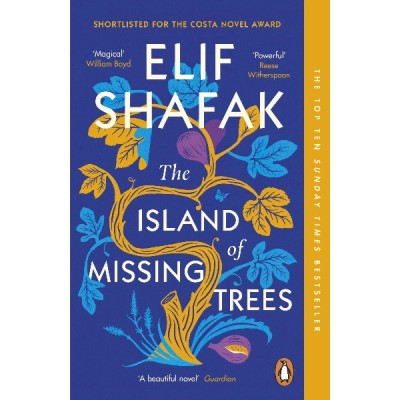Island of Missing Trees, The
Shafak, ElifHidden beneath the tree that grows through the roof of The Happy Fig taverna, teenagers Kosta and Defne happily ignore the social prohibitions of their respective Greek and Turkish communities, until Civil war breaks out, in 1974.
Reunited decades later, they migrate to London to fashion a new life, but for their daughter Ada, the toll of intergenerational trauma demands answers from the past.
Lyrical, haunting and thought-provoking, this is the story of Cyprus' tumultuous history traced through the lives of a single family and revealing the devastation to its people and the natural world.
Pages
368
368
Year
2022
2022
Reviews
01-07-2024
Atmospheric setting, very well-written. Well received by our group.
25-06-2024
Thoroughly enjoyed by several in the group, others were lukewarm.
10-06-2024
A beautiful book about a broken island, love and grief. A powerful novel very much enjoyed by all the members.
10-06-2024
Everyone reallly enjoyed this book, after initially getting used to Fig Tree! All agreed that it was very cleverly written, giving us a great insight into the Turkish/Greek conflict about which none of us knew a lot. Very enjoyable read.
10-06-2024
Enjoyed by everyone. Initially uncertain with the tree narration but eventually enjoyed it. Characters excellent.
20-05-2024
Beautifully written. We loved the book - the many layers of imagery and symbolism, the contrasting characters and the way the author set them against the turbulence of a divided Cyprus. Most of us enjoyed the 'botanical' facts but some thought they were overdone.
16-05-2024
We all agreed the quality of the writing was impressive. On the whole we appreciated the fig tree's narration. We discussed the impact of repressed memories, displacement, damage to the environment, and also our set of photographs of Cyprus taken in 2002.
07-05-2024
We all really enjoyed the book. 100% positive feedback.
29-04-2024
A highly informative novel about life in Cyprus from the 1970s onwards with thoughtful characterisation, including the central narrator/character, the Fig Tree. The group thought the story was compelling and the detail interesting.
22-04-2024
Some of the group loved this book, others found it interesting and it provided a very good discussion. Good background to Cyprus in the 1970s, and the Turkish-Greek conflict. A comment was made that this story was constructed ( as many are currently) going back and forth in time between the present and the past. Some found this disruptive when following the narrative.
04-03-2024
All but one really enjoyed this book, especially the quality of the writing. A truly beautiful story.
19-12-2023
Enjoyed by the group. Interesting read & lots of discussion. Our memories of Cyprus in the 70s were vague. Great use of concepts from the natural world including the personification of a fig tree.
28-11-2023
Some loved it and gave it a high rating, while others struggled to get into it from the tree side of things!
03-11-2023
Everyone enjoyed this book. It prompted quite a discussion about conflicts where people divided by culture/history share the same homeland.
01-11-2023
The group was 50/50 split on whether the narration choice to have the fig tree's perspective worked or not. Some found the fig tree's chapters turned them off an otherwise compelling book; others loved the tree as a narrator.
13-09-2023
We loved this book. Great story, well-written. The history of Cyprus was so interesting.
01-09-2023
We felt that this book was prose driven rather than plot driven. But the setting in Cyprus in 1974 we found very interesting, as somehow the history of this island has not really impacted on us in NZ.
21-08-2023
The majority liked or loved this book.
13-07-2023
Overall we enjoyed this book and several of us will search for other titles by the author. It revived memories about the Cyprus conflict and it was so good to understand more. We liked the mixture of history and story, the fictionalising of actual events. Some loved the idea of the fig, others not so much.








